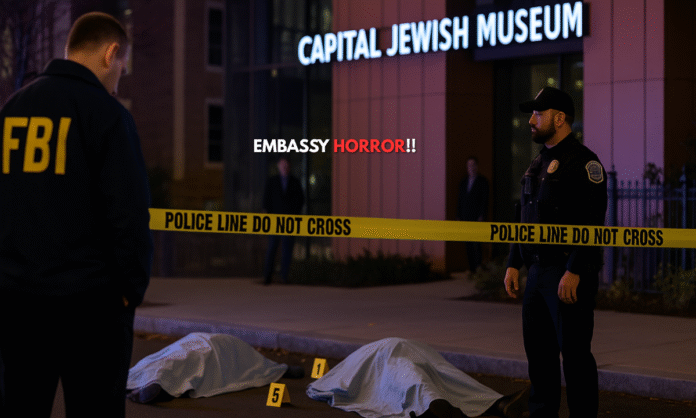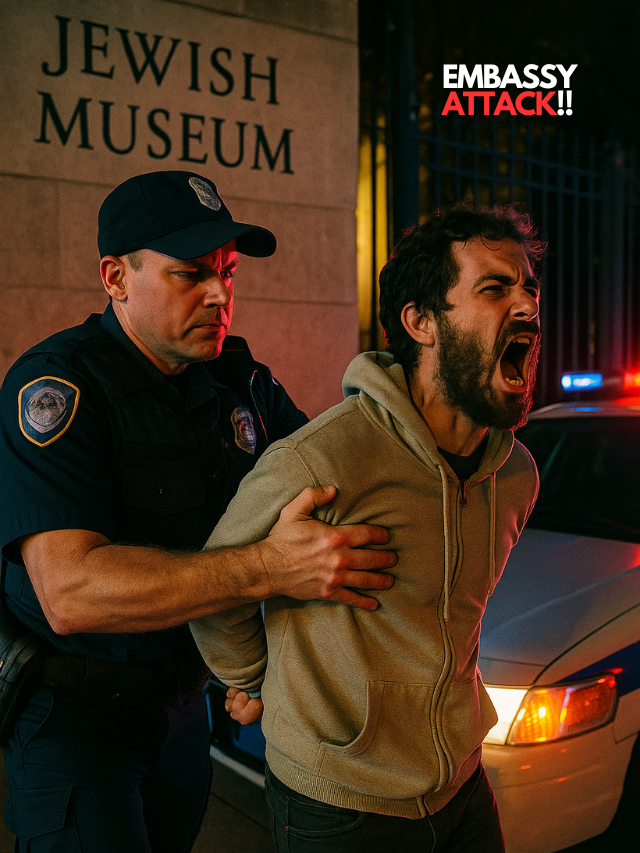Summary
- Two Israeli Embassy staff were shot dead near the Capital Jewish Museum in Washington, DC, in what officials call a hate-fueled act of anti-Semitic terrorism.
- The suspect, Elias Rodriguez, was arrested at the scene after reportedly shouting “Free, free Palestine.”
- Global condemnation poured in, with Israel and the U.S. vowing justice amid rising tensions over anti-Jewish hate in Western cities.
A Shooting at the Diplomatic Heart of DC
It was just another evening in Washington—until it wasn’t. Within meters of the FBI’s Washington Field Office and outside the Capital Jewish Museum, two Israeli Embassy staff members were gunned down. The assailant, identified as 30-year-old Elias Rodriguez of Chicago, was arrested while reportedly chanting “Free, free Palestine.” Authorities are now calling it what it is: a premeditated act of anti-Semitic terrorism.
The victims’ names have not been made public, but their affiliation with the Israeli diplomatic mission has been confirmed by local reports and officials. The attack occurred during an event hosted by the American Jewish Committee (AJC), drawing a direct line between public Jewish spaces and extremist violence. Israel’s President Isaac Herzog called it a “despicable act of hatred,” while U.S. President Donald Trump said the killings were “obviously based on antisemitism” and demanded that such hatred “must end, NOW.”
The Israeli Embassy has remained tight-lipped, confirming only that Ambassador Michael Brodsky was not present at the time. Meanwhile, U.S. Homeland Security Secretary Kristi Noem assured that a full federal investigation is underway, coordinated between local and national agencies. The proximity of the crime scene to both the Jewish Museum and the FBI field office adds to the symbolic and security implications of the shooting.
Israeli embassy staffer among 2 shot dead near D.C.’s Capital Jewish Museum during Young Diplomats Reception.
— Frank McCormick (@CBHeresy) May 22, 2025
A lot of people on X have blood on their hands, but they’ll find a way to somehow blame Jews and Israel for this. pic.twitter.com/fJhAPZQpPe
A Hate Crime in Broad Daylight—and Broad Silence?
- The incident took place near a high-security federal area, raising questions about intelligence failures.
- Witnesses say the attacker invoked Palestine as motive—linking the violence to growing geopolitical tensions.
- Jewish advocacy groups condemned the broader climate of normalized hate against Jewish institutions.
- Critics argue Western capitals are becoming blind spots for anti-Semitic radicalization.
This wasn’t a lone act in an alley. It happened in a capital city, at a Jewish landmark, during a community event, under the gaze of federal buildings. That alone makes it chilling. Yet even more disturbing is the potential normalization of such hate. The AJC’s CEO, Ted Deutch, stated, “We are devastated that an unspeakable act of violence took place outside the venue,” highlighting the deep psychological and social impact such events leave on Jewish communities globally.
Survivors and eyewitnesses reported that the shooter was not acting erratically or impulsively—his chants and location choice point toward deliberate targeting. While police have been quick to cordon off the area and begin surveillance retrieval, advocacy groups argue the broader climate of passive tolerance for extremist rhetoric is the real danger.
The FBI’s Director Kash Patel noted his team was “briefed immediately” and would keep the public updated. But critics argue that reactionary enforcement can’t substitute for proactive de-radicalization, especially when anti-Semitic sentiment is becoming mainstream in certain ideological echo chambers.
Politics, Palestine, and the Weaponization of Rage
- Tensions around Israel-Palestine have re-erupted violently in U.S. and European cities since early 2024.
- Critics warn that digital echo chambers are enabling lone actors to radicalize around geo-political flashpoints.
- U.S. lawmakers and Israeli officials now face renewed scrutiny over embassy staff protection protocols.
- The fusion of anti-Israel rhetoric and antisemitism is reigniting painful historical fears among diaspora communities.
While Elias Rodriguez’s motivations will be dissected in the weeks ahead, what’s evident is that he didn’t operate in a vacuum. The shooting taps into a larger and more dangerous pattern: the fusion of global politics with localized hate. Since the 2024 Gaza conflict reignited global debate, Jewish institutions in the West have faced increasing threats—both physical and digital.
Rodriguez’s chant—“Free, free Palestine”—before his arrest raises uncomfortable questions. Was this a misguided expression of political protest, or something darker? President Herzog was clear: “Terror and hate will not break us.” But for many Jews in the U.S., the shooting confirmed a long-feared reality—that anti-Israel activism is sometimes weaponized as a cover for anti-Jewish violence.
This ideological blurring is now affecting security protocols. How should embassy staff be protected in Western capitals? Should Jewish community events require police presence by default? The answers remain complex, but the urgency is now undeniable.
When Silence Kills: The Cost of Ignoring Hate
The killing of two Israeli diplomatic staff in the heart of Washington is more than a law-and-order issue—it’s a seismic reminder of what happens when hate is allowed to fester. The shooter may have pulled the trigger, but the ideological ammunition has been piling up for years—in forums, in protests, and in political doublespeak.
For Jewish communities, this isn’t just grief—it’s déjà vu. From Pittsburgh to Paris, the trend line is unmissable. The global rise of anti-Semitic violence doesn’t always come with swastikas and marches. Sometimes, it’s a bullet outside a museum.
Western democracies must now answer difficult questions. Are their policies and policing frameworks agile enough to respond to the hybrid threat of ideological terrorism? Is enough being done to separate political protest from racial or religious hate? And crucially—who is speaking out when the targets are Jewish?
To answer these questions too late is to invite the next tragedy. The time to speak, investigate, and intervene is now.



